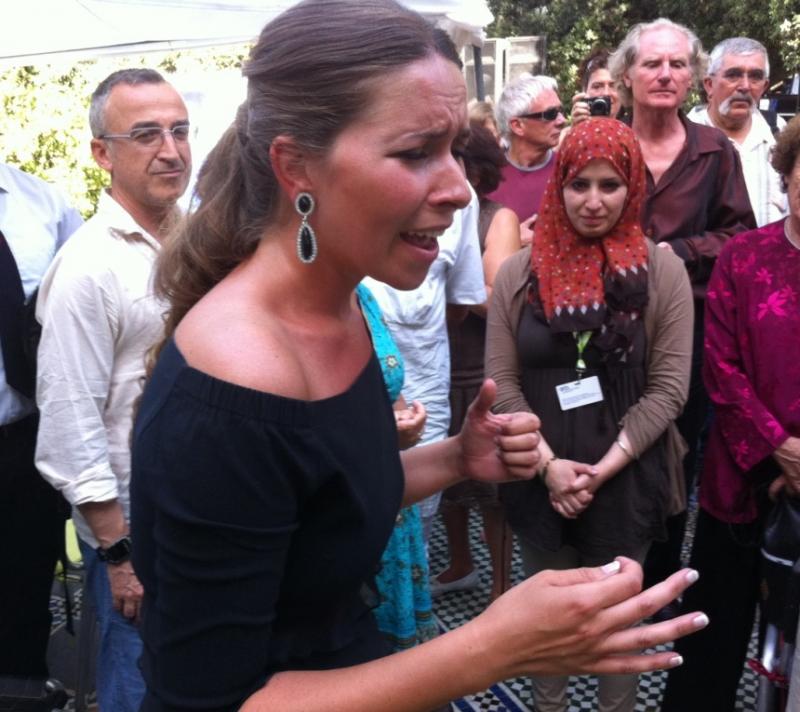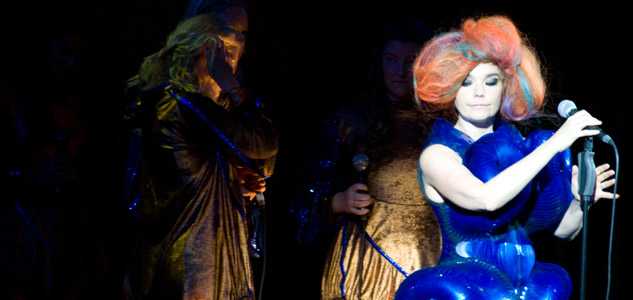theartsdesk in Fes: Bjork among the Gnawas | reviews, news & interviews
theartsdesk in Fes: Bjork among the Gnawas
theartsdesk in Fes: Bjork among the Gnawas
The Festival of World Sacred Music remains a beacon of tolerance in Islamic North Africa

Wandering through the winding alleyways of the Medina, there was Bjork dressed in a dazzling blue dress and hat and listening to a Gnawa group with its dull, thudding bass and metal castanets. She was here to perform at the Fes Festival of Sacred Music, although the presence of Bjork suggests at times the notion of sacred may be a bit blurred. She has anyway said that her favourite singer is the wonderful Sufi singer Abida Parveen, and spent several days exploring the city.
Fes is one of the holiest cities in Islam. With a university that predates Oxford and Cambridge by three centuries, and was founded by a woman, the city has always been an engine room for the exchange of ideas.The Fes Festival of World Sacred Music. with its morning Forum discussions and performers of diverse spiritual paths is a fitting continuation of the legacy of the city. Now in its 18th year,the Festival has been a beacon of tolerance in one of the great holy cities of the Islamic world.
Fes also has a more specific role as centre of Sufi Brotherhoods,.I spent one afternoon with Ibrahim Tijani, one of the leading members of the Tijani Brotherhood founded by his forebear Ahmed al-Tijani who died in 1815, and whose shrine is one of the most visited in Fes.
The most impressive of the singers this year were women
Sitting in a lovely garden deep in the Medina (pictured below), Ibrahim explained there are basically two sorts of Sufi groups: the “popular” Sufis like the Gnawas I had seen in the medieval medina with Bjork and the Aissawas, who mix avant-jazz drumming with huge n’far horns designed to wake you up, both literally and spiritually. These tend to be followed by the masses. In the case of the Aissawas, they are also followed by majdoubs, the "holy fools" who go into trance with their music - here they might be sectioned or given large doses of Prozac, in Morocco they use the healing qualities of the drums as their therapy. Late very night at the Festival they have assorted variants of these popular Sufi groups at Dar Tazi.
 The other type of Sufi groups like the Tijani are more “serious” and usually use only chanting rather than music. The Tijani brotherhood has famous musician followers like Youssou N’Dour and Amadou & Mariam, both of whom have memorably performed here,
The other type of Sufi groups like the Tijani are more “serious” and usually use only chanting rather than music. The Tijani brotherhood has famous musician followers like Youssou N’Dour and Amadou & Mariam, both of whom have memorably performed here,
Ibrahim is only 30 and part of the internet generation, connecting to the growing followers around the world, including thousands in Russia and Japan, who can take virtual tours around the shrine.
At the same time as this remarkable expansion, what is heart-breaking for Ibrahim is that in the last few months two Tijani shrines have been ransacked by Islamists in Tunisia and Timbuktu in Mali. In the last week, UNESCO placed Timbuktu's 13 main Sufi shrines on a list of heritage sites in danger. Sanda Ould Boumama, the Islamic group Ansar Dine spokesman's response quoted on Al Jazeera was "Ansar Dine will destroy every mausoleum in the city. All of them, without exception."
From Ibrahim's point of view, “the Salafists believe God is separate from creation, but we believe we can see God’s face everywhere". He adds, “The split within Islam is worse than that between the West and Islam”.
This is more or less exactly the phrase the writer William Dalrymple used in the excellent Channel 4 TV film Sufi Soul (worth seeing, and available from World Music Network) directed by Songlines editor Simon Broughton which has some atmospheric footage of Fes music and the medina). When I met the Pakistani Ambassador, she firmly disagreed. “The West exacerbated the split between the Sunnis and the Shias, in Iraq they got on perfectly well until the war." I decided not to mention the Iran-Iraq war. But what about the Islamists who destroy Sufi shrines? “They are not Muslims” she said, with some finality.
While there was sublime singing from the Egypian Sufi (and superstar - he sells cassettes by the pyramid) Sheik Yasin Al-Tuhami and the Guinean griot Mory Djely Kouyate, who performed an innovative set with blind French pianist Jean-Phillipe Rykiel, the most impressive of the singers this year were women. Sanam Marvi, a Pakistani in the kafi tradition of Abida Parveen, the great Sufi singer who the festival’s improbable star act Bjork says is her favourite singer. The Vahdat sisters, unable to sing in public in their native Iran, transfixed an audience in the ornate Mokri Palace accompanied by a heart-rending oboe-like ney. When I asked what was special about the ney, I was told that "it has the same number of holes as the human body".
 Perhaps the highlight of the whole Festival was a premiere of an intriguing and thrilling new setting of Lorca songs sung by Rocio Marquez with music composed by pianist Christian Boissel. An important part of the DNA of Fes is a deep nostalgia for the old Andalusia, where Christians, Muslims and Jews more or less co-existed and were at the forefront of the worlds of medicine, music, architecture and poetry. It seemed the perfect place to hear Lorca’s strange poem about Cordoba - “Far away and lonely/ Though I know all the roadways/ I’ll never get to Cordoba."
Perhaps the highlight of the whole Festival was a premiere of an intriguing and thrilling new setting of Lorca songs sung by Rocio Marquez with music composed by pianist Christian Boissel. An important part of the DNA of Fes is a deep nostalgia for the old Andalusia, where Christians, Muslims and Jews more or less co-existed and were at the forefront of the worlds of medicine, music, architecture and poetry. It seemed the perfect place to hear Lorca’s strange poem about Cordoba - “Far away and lonely/ Though I know all the roadways/ I’ll never get to Cordoba."
The festival theme this year was “Re-enchantment”. Bjork's performance (pictured above left) featured massive videos of microscopic gene spirals and abstract geometric patterns; when they weren’t recalling a bad trip they were in this context quasi-Islamic. The least obviously sacred artist here, she sang with a gospel choir from Reykyavik. The videos distanced her show somewhat from the crowd, who seemd initially baffled but they did warm to her, and her perfomance and trancey videos were certainly enchanting..
Add comment
more New music
 theartsdesk on Vinyl 83: Deep Purple, Annie Anxiety, Ghetts, WHAM!, Kaiser Chiefs, Butthole Surfers and more
The most wide-ranging regular record reviews in this galaxy
theartsdesk on Vinyl 83: Deep Purple, Annie Anxiety, Ghetts, WHAM!, Kaiser Chiefs, Butthole Surfers and more
The most wide-ranging regular record reviews in this galaxy
 Album: EMEL - MRA
Tunisian-American singer's latest is fired with feminism and global electro-pop maximalism
Album: EMEL - MRA
Tunisian-American singer's latest is fired with feminism and global electro-pop maximalism
 Music Reissues Weekly: Congo Funk! - Sound Madness From The Shores Of The Mighty Congo River
Assiduous exploration of the interconnected musical ecosystems of Brazzaville and Kinshasa
Music Reissues Weekly: Congo Funk! - Sound Madness From The Shores Of The Mighty Congo River
Assiduous exploration of the interconnected musical ecosystems of Brazzaville and Kinshasa
 Ellie Goulding, Royal Philharmonic Concert Orchestra, Royal Albert Hall review - a mellow evening of strings and song
Replacing dance beats with orchestral sounds gives the music a whole new feel
Ellie Goulding, Royal Philharmonic Concert Orchestra, Royal Albert Hall review - a mellow evening of strings and song
Replacing dance beats with orchestral sounds gives the music a whole new feel
 Album: A Certain Ratio - It All Comes Down to This
Veteran Mancunians undergo a further re-assessment and reinvention
Album: A Certain Ratio - It All Comes Down to This
Veteran Mancunians undergo a further re-assessment and reinvention
 Album: Maggie Rogers - Don't Forget Me
Rogers continues her knack for capturing natural moments, embracing a more live sound
Album: Maggie Rogers - Don't Forget Me
Rogers continues her knack for capturing natural moments, embracing a more live sound
 theartsdesk at Tallinn Music Week - art-pop, accordions and a perfect techno hideaway
A revived sense of civilisation thanks to dazzlingly diverse programming
theartsdesk at Tallinn Music Week - art-pop, accordions and a perfect techno hideaway
A revived sense of civilisation thanks to dazzlingly diverse programming
 Album: Lizz Wright - Shadow
Brilliant album from superlative vocalist
Album: Lizz Wright - Shadow
Brilliant album from superlative vocalist
 Album: Shabaka - Perceive its Beauty, Acknowledge its Grace
A quiet and reflective breakthrough
Album: Shabaka - Perceive its Beauty, Acknowledge its Grace
A quiet and reflective breakthrough
 Album: Nia Archives - Silence is Loud
Sweeping up generations' worth of influences into a giddy pop rush
Album: Nia Archives - Silence is Loud
Sweeping up generations' worth of influences into a giddy pop rush
 Music Reissues Weekly: Patterns on the Window - The British Progressive Pop Sounds of 1974
A nebulous year in music resists easy definition
Music Reissues Weekly: Patterns on the Window - The British Progressive Pop Sounds of 1974
A nebulous year in music resists easy definition
 Album: Fabiana Palladino - Fabiana Palladino
A remarkably sleek and sophisticated debut
Album: Fabiana Palladino - Fabiana Palladino
A remarkably sleek and sophisticated debut

Comments
Youssou N'Dour is a Mouride,